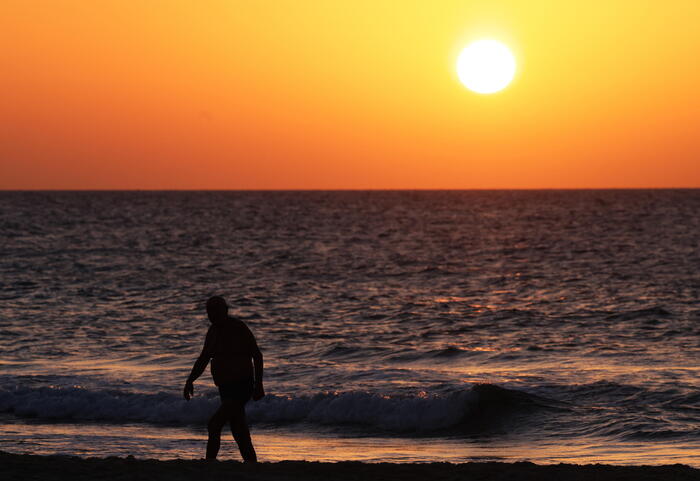She wants “air” but all she stirs with her fan is heat.
Under her tin roof, Oum Mohammed, 74, is suffocating.
It's 45 degrees in Basra, southern Iraq, and summer is just beginning.
“By God, we are tired,” she whispers.
An unusual heat wave hit Iraq in June, a country where high temperatures are the norm.
In Baghdad, the mercury scraped the sheltered 50 degrees earlier this month, according to state broadcaster Iraqiya.
In Basra, where the air is heavy with heavy humidity from the Gulf, even the Iraqis are "wobbly", says Oum Mohammed, "woken up in the middle of the night" by the heat.
Due to lack of maintenance and capacity, the electrical network is failing and only provides a few hours of power per day.
Paying the owner of a private generator is not within the reach of all budgets: around 100 euros per month for a family of four.
Like many Iraqis, Oum Mohammed does not have as much money to shell out.
She is angry with the government for not providing electricity coverage.
“Why is he doing this?
He should help the poor, not fight them.
Even God doesn't agree,” grumbled the old lady, wrapped in her black abaya.
Climate change as the main cause
A summer in hell, after a spring punctuated by a dozen sand and dust storms, themselves caused by climate change and the desertification of Iraq, according to meteorologists.
"With the heat waves and sandstorms which will increase, we expect to treat more patients for pathologies linked to the climate", explains Seif Al-Badr, spokesperson for the Ministry of Health to AFP.
The climate is changing, temperatures are rising and Iraq is at the forefront, warns its president Barham Saleh.
He called for making the fight against the effects of climate change “a national priority, because it is an existential threat for future generations”.
In the countryside, the harvests promise to be catastrophic.
"Desertification affects 39% of Iraqi land, water scarcity is a problem in all our regions," said Barham Saleh.
But for now, the climate is relegated to the background of the political agenda.
Eight months after the legislative elections, the majority Shiite parties have still not managed to agree on the name of the new Prime Minister.
The current head of government Moustafa Kazimi handles current affairs.
" It's hell "
For Nataq al-Khafaji, a resident of Nassiriya (south), this means "living without electricity".
It was 44 degrees that day.
“I'm still fine, but for children and the elderly, it's very hard,” he says.
" It's hell ".
During the summer holidays, her three children have nowhere to go, no water park, no green space.
They stay at home doing nothing, immersed in the barely refreshing darkness of their home.
To bring in a tiny bit of air, Nataq has invested in a paltry battery-powered fan and he wonders “how to withstand the six months when it will be almost 50 degrees”.
“Last winter, it hardly rained because of climate change,” he says.
In Baghdad, Abbas Nasser, 20, works as a day laborer on construction sites.
Today, he carries wheelbarrows of sand.
"The heat is killing us," he said, pouring a swig of cold water on his head.
He says he works 11 hours a day for 30,000 dinars (about 20 euros).
It's very little, "but the one who sits around and does nothing dies of hunger."
Abbas sometimes asks his boss for a break, "but he does not accept".
“He says I have to work,” he concludes.
An energy crisis
Iraq may be one of the countries best endowed with hydrocarbons in the world, but it is facing an energy shortage.
It therefore turned to Iran, which supplies it with a third of its gas consumption to run its power plants.
However, Baghdad left a $1.6 billion bill outstanding for two years to Tehran, which cut off gas for a few weeks in the spring.
Iraq finally settled its bill in mid-June.
But that does not prevent power cuts several times a day.
The level of the rivers continues to drop due to rainfall deficits and dams built by Turkish and Iranian neighbors.
And that's just the start.
The World Bank has estimated that in the absence of appropriate policies, Iraq could experience a 20% drop in its available freshwater resources by 2050.














/cloudfront-eu-central-1.images.arcpublishing.com/prisa/IGZ7GOCXZ5GUPAQ2HWGK6Z76BU.jpg)